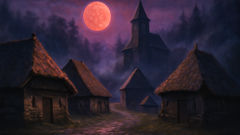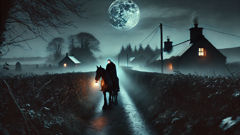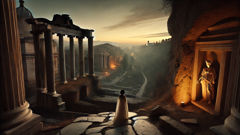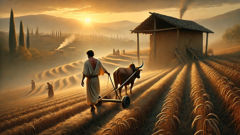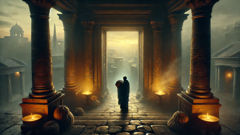Introduction
The wind howled like a living thing through the Carpathian pines, swirling mist across the moonlit slopes and casting restless shadows over the thatched rooftops of Vâlcea. At the edge of the village, the forest pressed in close—a brooding presence older than the stone church and the winding lanes of mud and cobble. The villagers had always lived with fear in their marrow. They whispered of things that walked beneath the boughs at dusk, of eyes that glittered red beyond the pale birch trunks, and of graves that refused to keep their secrets. They called these terrors strigoi—spirits of the dead, sometimes twisted into vampires, other times merely lost souls, yet always a threat to the living. It was said that the restless dead were drawn to unfinished business, a grudge, or a tragic ending. Sometimes a strigoi was born from the wronged, the shunned, or those who died outside the holy rites. Once, the old tales were enough to keep doors bolted and garlic hanging from lintels. But on the night of the blood moon, something changed. The livestock were found drained, their eyes wide in terror. Children shivered with feverish nightmares and refused to sleep. The priest’s hound howled at the empty air, hackles bristling. It was the healer, Iulia, who first sensed a deeper malice—a darkness creeping like fog into every crack and crevice. She alone dared to walk the midnight paths, lantern in hand, seeking signs in the bent grass and claw marks on the trees. The villagers watched her with equal parts awe and suspicion. No one had the heart to warn her that when the strigoi came, even courage could be devoured. For beneath the roots of the ancient Carpathians, something old was stirring. And as the mist thickened and the moon turned red, the line between the living and the dead blurred into a single, shivering breath.
The Omen in the Pines
Iulia pressed deeper into the woods, lantern held high as its flame flickered in the shifting wind. The forest was alive with sounds—branches creaking, leaves rustling, the distant snap of a twig. The stories she’d heard since childhood echoed in her mind: the strigoi who rose from shallow graves, seeking warmth in stolen blood, haunting those who had wronged them. The villagers believed that garlic and holy water could hold them at bay, but Iulia suspected the truth ran deeper, older than the church’s words or her mother’s hushed warnings.
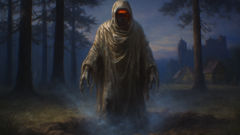
That night, a sense of dread weighed on her shoulders. The livestock found dead by sunrise had been drained in ways no wolf could manage, their wounds dry, their bodies untouched by scavengers. Iulia’s keen eyes noticed the lack of footprints, save for faint, claw-like impressions leading from the barn to the edge of the pines. She had gathered herbs and charms, each blessed by the priest at her insistence, but she knew no charm was strong enough to banish a strigoi with unfinished business. Her thoughts turned to Marin, the old woodcutter, buried just a week before. He’d died with bitterness on his tongue, cursing the villagers who’d shunned him for suspected crimes. His grave was shallow, hurriedly dug in rocky soil. Now, as she knelt by his burial mound, the earth seemed disturbed, as if something had clawed its way out from below.
A cold hand brushed her shoulder—a trick of the wind, she told herself, yet her heart thudded in panic. The moonlight seemed to pulse and flicker, shadows lengthening in unnatural ways. Something moved between the trees: not a beast, but a figure tall and thin, its eyes reflecting crimson in the darkness. Iulia ducked behind a mossy boulder, barely daring to breathe. The figure glided past, shrouded in tattered burial linen, skin pale and taut as parchment. She recognized Marin’s twisted features, his mouth split in a snarl of hunger and hate. The strigoi was real. It had come home.
She waited until the footsteps faded, then stumbled back to the village, her mind reeling. She burst into the priest’s house, breathless, insisting on a gathering. By candlelight, she told her story to a room thick with fear and disbelief. Some scoffed, others crossed themselves repeatedly. The priest, Father Petru, nodded grimly—he’d seen signs as well: milk curdling overnight, strange marks at the church door, bats gathering in impossible numbers beneath the eaves.
Together, they plotted their defense. Stakes of ash were sharpened, wild rose stems gathered for protection, and every home marked with chalk and blessed salt. But as midnight drew near, Iulia sensed it was not enough. The strigoi were not mindless monsters—they remembered, they plotted. Marin’s vendetta was only the beginning. The elders recalled older tales: strigoi could summon others of their kind, growing in strength with every soul they claimed. Iulia resolved to face Marin before he could call his kin. Clutching her charms and a silvered blade, she slipped once more into the forest, where the line between this world and the next thinned with every step. The pines seemed to close around her, the mist thickening until even her lantern’s glow faded into blue shadow.
As she reached the heart of the forest, the air grew cold, and the ground turned soft underfoot. Shapes writhed among the roots—spectral forms, whispering names and curses. At the center stood Marin, flanked by shadows with glowing eyes. He beckoned, his voice thick with rage and longing: "You left me to rot. Now you’ll join me in the cold."
Iulia raised her blade and her voice, invoking the names of saints and ancestors. Light flared, pushing back the shadows for a heartbeat. But the strigoi advanced, hunger undiminished, their claws reaching for the warmth of the living. Iulia fought with every scrap of courage, every memory of kindness she had ever known. In the end, she stood alone in the moonlit clearing, trembling but unbroken, as dawn crept over the horizon and the strigoi melted into mist. For now, the village was safe—but Iulia knew darkness would return whenever old grievances festered and graves were left untended.
The Siege of Shadows
The sunrise brought little comfort. In Vâlcea, villagers shuttered their windows and clutched their children close. Stories of Iulia’s midnight encounter spread like wildfire; some claimed she had banished Marin single-handedly, others whispered she had struck a secret bargain. Only Iulia knew how close she’d come to death, and how fragile their reprieve truly was.
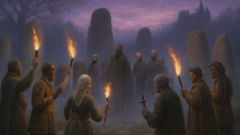
As days passed, subtle signs of corruption crept through the village. Milk soured before noon, bread molded overnight, and dogs barked at nothing in the dead of night. The priest found strange sigils etched into church walls—marks no living hand could have drawn. Children began to sicken with inexplicable chills, their dreams haunted by pale figures tapping at frosted panes. Each morning, new graves showed signs of disturbance: earth clawed loose, crosses toppled.
Desperation drove the villagers to old rites. They sprinkled poppy seeds on thresholds to confuse wandering spirits and placed mirrors facing outwards to reflect evil back. Iulia scoured her mother’s grimoires, seeking forgotten remedies: wormwood bundles for windows, iron nails driven into doorways, rose thorns beneath pillows. Yet each night, she felt the strigoi’s presence growing bolder—Marin no longer alone, but leading a gathering host.
One evening, as the sky bruised to violet, Father Petru called a council in the church. Iulia spoke plainly: unless they faced the strigoi in their lair, the entire village would be lost. The bravest among them—hunters, farmers, even the skeptical blacksmith—agreed to join her. Armed with stakes, torches, and relics, they set out beneath a waning moon, hearts thundering in unison.
The forest had changed since Iulia’s last journey. Roots twisted into unnatural patterns, and every shadow seemed to harbor watching eyes. A flock of crows erupted from the treetops as the villagers marched deeper, their cries echoing like warnings. They reached a clearing where the earth lay blackened and cold, ringed by ancient stones. Here, the strigoi gathered—a host of hollow-eyed revenants, led by Marin’s twisted form. Their presence chilled the air and dulled the light of every torch.
Father Petru raised his crucifix, voice trembling but resolute: “Return to your rest! This is sacred ground!” The strigoi hissed and recoiled, but pressed forward as the priest’s strength waned. The villagers fought desperately, driving stakes into chests that crumbled to dust, scattering holy water that sizzled against spectral skin. Iulia faced Marin, her blade gleaming with consecrated oil.
Marin’s voice was both pleading and furious: “Let me in, Iulia. Remember when you tended my wounds? The others abandoned me—only you stayed. Yet you let me die alone.”
She faltered, memories rushing in—how she had sat by his sickbed, holding his hand as fever wracked his body, how the others shunned her for showing kindness to an outcast. But she steeled herself. “You’re not Marin anymore,” she said. “You’re only what grief has left behind.”
With a final prayer, she plunged her blade into his heart. The revenant screamed, light bursting from his eyes and mouth before collapsing into ash. The remaining strigoi shrieked and scattered, vanishing into mist.
By dawn, the survivors limped back to Vâlcea. They buried the ashes at a crossroads and scattered salt over the graves, as tradition demanded. Iulia collapsed at her hearth, haunted by what she’d seen—by how easily love and sorrow could twist into something monstrous. Yet she knew she’d spared her village from a fate worse than death, at least for now. The legend of the strigoi would persist for generations, but so would the story of a healer who dared to face the shadows.
Conclusion
The mists retreated with spring’s first warmth, but the legend of the strigoi never truly left Vâlcea. In every lullaby and every cautionary tale whispered around hearths, children learned to respect the boundary between life and death—and to honor the restless souls who might return when wronged or forgotten. Iulia, once an outsider for her curious ways, became the guardian of her people’s memory. She tended the graves, remembered the outcasts, and taught others how to recognize pain before it could rot into vengeance. In time, new terrors would come—wars, plagues, and other shadows—but Vâlcea endured, its people bound by a hard-won wisdom: that evil thrives in silence and neglect, while courage shines brightest when shared. And deep beneath the ancient pines, where moonlight and mist still dance, the restless dead slumber uneasily, held at bay by a village that remembers their names.

